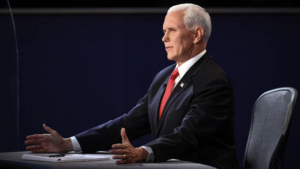Home » Commentary » Opinion » 2020 White House race: Upside down view of what should be
· The Australian
 Maybe the US presidential tickets are upside-down. Americans might face a less troubling choice if Mike Pence and Kamala Harris were the presidential candidates rather than the actual candidates, who embarrassed America on the global stage last week.
Maybe the US presidential tickets are upside-down. Americans might face a less troubling choice if Mike Pence and Kamala Harris were the presidential candidates rather than the actual candidates, who embarrassed America on the global stage last week.
In an encounter characterised by relatively polite disagreements, the 61-year-old Vice-President and 55-year-old California senator defended their party’s agendas, while carefully avoiding the nasty attacks of the first presidential debate. In substance, the candidates echoed the disagreements of Donald Trump and Joe Biden, but with a muted tone that seemed aimed at reassuring the public about their respective commitments to civility.
Both Pence, a former radio talk show host, and Harris, a former prosecutor, did their homework, sounded presidential — admittedly a low bar after last week’s depressing spectacle — and made the case for their respective campaigns.
Even with very few mentions of Trump, Pence exhibited an easy talent as an articulate and confident defender of his leader. Indeed, if Trump could make the case for Trump half as well as Pence makes the case for Trump, the President would have a much better chance of re-election.
As for Harris, she held her own while subjecting the administration’s record to scrutiny. She carries baggage — she ran as a left-wing progressive during the Democrat primaries — but the power of her reverse gear and U-turns during the debate were up to best international standards.
One of the sharpest exchanges of the evening involved climate and energy policy. Harris accused the Republicans of climate denial; Pence fired back that the Democrats would scrap shale gas fracking, which has made the US more energy efficient and independent. Harris denied the charge, but she will fail to persuade rust-belt voters, who know the process of decarbonising the economy is not a cost-free exercise.
Also notable was the debate on China, with Harris claiming that Trump’s trade war has failed. Memo to Australian advocates of the old “engagement” consensus: Republicans and Democrats are both tough on China.
Although almost refreshingly low-key, the debate seemed unlikely to have an immediate impact on the polls, which show Biden commanding a double-digit lead over Trump. That’s not surprising. After all, the vice-presidential debates have been like the vice-presidency itself: well-publicised but largely inconsequential.
Vice-presidential debates are rarely “won” in any meaningful sense. A smart, polished performance by any running mate is usually forgotten after the next presidential debate.
Solid performances have given struggling campaigns room to breathe. In 2012, vice-president Joe Biden restablised the Democrat campaign after president Barack Obama’s first debate performance was widely panned. In 2004, vice-president Dick Cheney performed a similar task when he showed the youth, inexperience and vanity of John Edwards.
But a vice-presidential debate can certainly be lost — in a way that if not haunts the campaign then certainly the career of the running mate who lost it. In 1988, for instance, George HW Bush’s running mate Dan Quayle’s look of shock as Democrat Lloyd Bentsen ridiculed his attempts to compare himself to John F. Kennedy ended his effectiveness as a campaigner.
Although there was no clear winner on Thursday, both the contestants and the commentators seemed impressed by the civics lesson that had been broadcast across the globe. In any case, the election is certain to be decided less on what the running mates said during this debate than on how the voters view Trump and Biden as leaders.
Debates are partly about momentum: they can increase momentum for a ticket considered to have won the first debate of the presidential nominees. If Biden has been on an upswing since last week, nothing that happened in Thursday’s vice-presidential stakes is likely to stop that.
2020 White House race: Upside down view of what should be